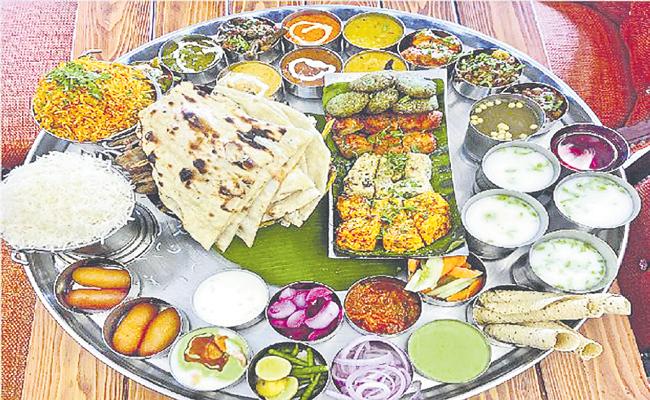Mukunda Foods CEO Eshwar K Vikas Interview With Sakshi Post

[ad_1]
A satisfying meal leaves a lasting positive impression on the mind, so customers expect the same taste from a particular brand irrespective of its location. This becomes a challenge, Mukunda Foods Co-founder & CEO Eshwar K Vikas tells Reshmi AR in an exclusive interview with Sakshi Post.
How is the Food Service Industry in India gearing up with Standardisation to serve good food?
The food service industry is constantly evolving and growing at a CAGR rate of 11.19%, and if we specifically look at chain QSRs, the highest growing segment is at 23 % CAGR over FY2020-2025. Looking at these numbers, we can also say many brands want to become a chain QSR. While expanding, food taste consistency and standardization become the major challenges, and brands are very conscious of it, especially all the new-age food brands. Each of the products from Mukunda Foods is aimed at standardizing the cooking process for commercial kitchens, and these machines ensure that food tastes the same 365 days, irrespective of who is cooking. The equipment are being used by clients like Wow Momo! Samosa Party, Burger Singh, and many others. A very interesting trend is that most of us believe that the chain is conscious of process and consistency; however, we have many single outlet or small chain clients who take it very seriously.
For example, Suraj Bhatia, Founder of Delhiicasy, a Chinese Food Brand, is an ambitious and progressive entrepreneur; he stresses the importance of having standard operating procedures to ensure that the food served at all his outlets tastes the same. This led him to automate the cooking process in his kitchens; with the help of Wokie and Eco-Fryer by Mukunda Foods, his kitchen dishes out close to 2,000 Chinese dishes per month. Automation also helps address challenges like minimizing human intervention and reducing labor costs and dependency on skilled labor.
As new edge food entrepreneurs, how are you looking at Scalability and profitability?
The industry’s scale is massive, there are over 1.6 million F&B outlets today, and each needs help with the same problem of maintaining consistency, attrition & cost pressure. Our solutions are unique & help the business improve operational inefficiencies and help them scale. So, the scale is relatively easy for us.
Profitability has been built into the business from day one as its product sale, and we did not sacrifice margins for growth. While at an org level, we are making a loss, which we plan to overcome by leveraging our expansion into new geographies & other repeat orders from the existing customer base.
How is automation fuelling the expansion journey of food brands?
A satisfying meal leaves a lasting positive impression on the mind, so customers expect the same taste from a particular brand irrespective of if the outlet is in Delhi or Bangalore. However, it gets really difficult to ensure the same taste with dependencies like training of staff, high attrition rates, and inability to replicate Chef’s recipes, and that’s where automation can be the solution. For instance, when I first met Ankit Jain, Founder of “The country Wok,” he shared that his head chef had designed the best recipes, but struggled to replicate them across all 20 outlets, especially with high attrition rates. Today, 7 of his outlets are already automated, and these kitchens serve close to 50-55 orders during peak hours while maintaining consistency. Ankit plans to open 150 outlets with these machines in the next two years since his training time and efforts have also decreased. A Newer gets trained in 3-4 days and starts serving what is expected.
Why do we need India-centric AI in the food tech Industry?
Technology isn’t usually the first thing that comes to mind when talking about the food industry. But nowadays, Artificial intelligence (AI) is gradually growing in the food industry. Artificial intelligence (AI) is increasingly used in the food industry to improve operations, reduce human error, and enhance product quality. For example, a company has developed an AI that digitizes food supply chains, making them more transparent, predictable, and efficient.
Our machines are IOT connected and the AI part of the system can predict potential machine failures and shutdowns in the next two weeks. The AI will detect potential issues and notify us, allowing our service team to address them before the machine stops working or the issue becomes a showstopper.
How technology and AI are helping small kitchen businesses accelerate their growth?
Technology plays a significant role in the small kitchen restaurant industry, helping to optimize operations, increase efficiency, and drive growth. Small kitchens have also begun to adopt new technologies such as automation for cooking, POS integration dashboards for orders, billing, inventory, reports, and automated processes to reduce waste in kitchens. In perspective, 40% of our customers are standalone businesses, and some have fully transitioned to automated kitchens.
So, the idea here is to build kitchens that the operationally efficient. So, when a business automates its kitchen, it reduces one’s dependency on a skilled workforce, reduces waste, enables existing staff to multitask, and creates a safer workspace for everyone in the kitchen. This was just an example, and that’s how relevant techs are helping to create an efficient kitchen
Trends & forecast in the kitchen automation industry for 2023
In India, Trends like self-service kiosks are becoming increasingly popular to provide contactless and efficient service, collect data, and enroll customers in loyalty programs while improving order accuracy. Another trend in the industry is the widespread use of POS software in restaurants and quick service establishments, which allows for seamless integration of inventory and commerce processes and is continuously improving with new features. Restaurants can now compare payments received from aggregator platforms to actual sales. Some solutions even provide tools for creating purchase orders, tracking stock receipts, managing transfers, and accounting for wastage, giving a comprehensive view of the entire supply chain. Artificial Intelligence is also playing a significant role in enhancing existing technologies, such as image detection technology, in ensuring that incoming materials are fresh enough to be accepted. As automation becomes more prevalent in the kitchen, the cooking process will become highly automated to eliminate human error and maintain consistency in food. Automation will be a regular feature in restaurant equipment, including frying, tossing, grilling, and roasting.
Tell us about your expansion plans
We are looking to expand our product portfolio expansion. We have recently launched two new products, i.e., Eco-Griller, a smart and intelligent griller & FiltrO, an oil filtration system and there is a plan of adding a few more automation tools. We are also looking at international expansion, specifically the Bay Area in the US, where there is a high demand for automated kitchen equipment.
[ad_2]
Source link






